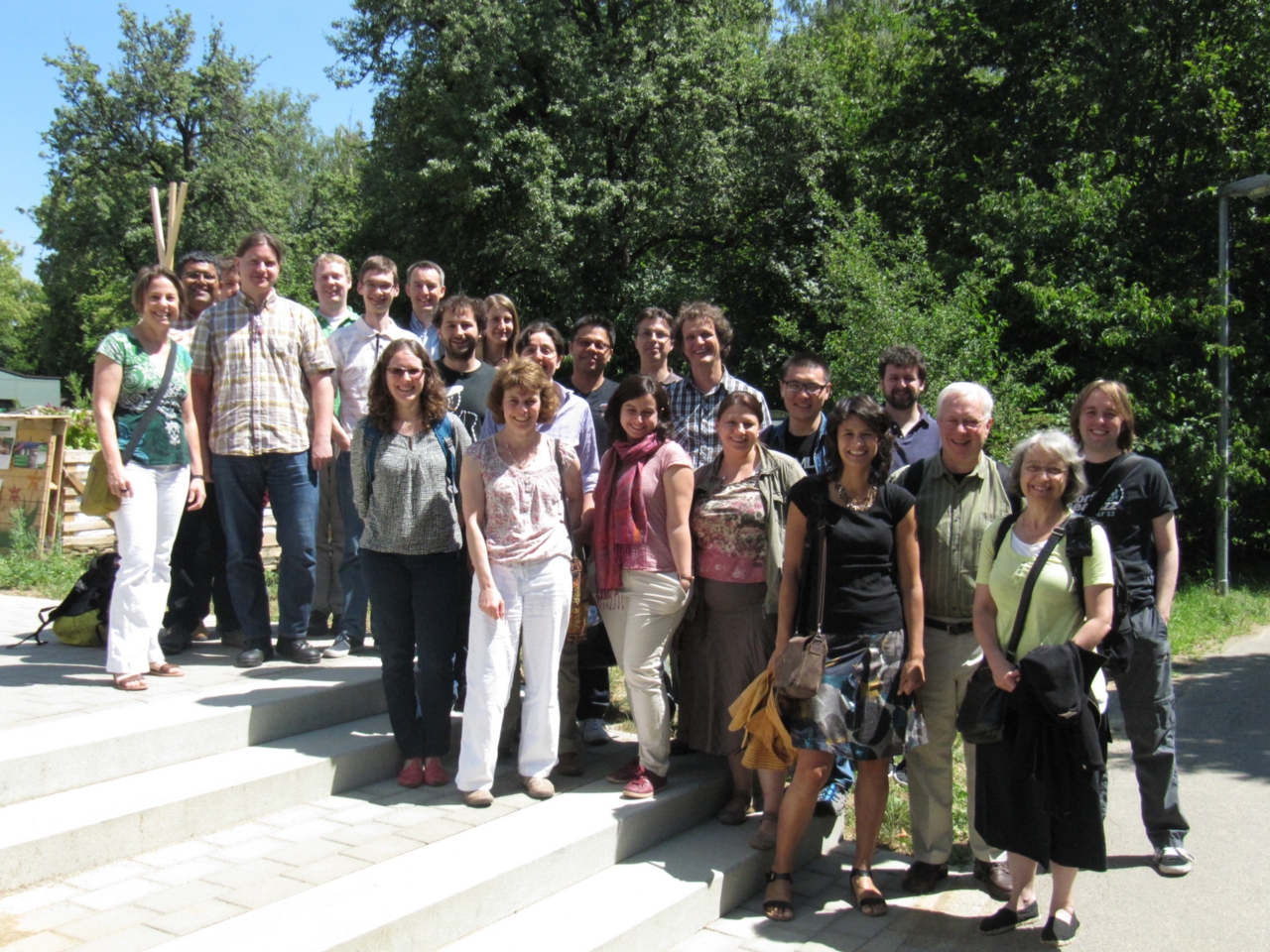We are pleased to announce five invited talks from researchers doing exciting work in various subfields within distributional semantics, including those whose work focuses on lexicography, compositionality, multi-modal modeling, psycholinguistics, and application-oriented uses of DSMs.

Program:
July 8, 2015
19.30
Dinner and Drinks: Brauhaus Schönbuch
July 9, 2015
9.30-10.00
Opening Session
10.00-11.00
Invited Talk: Harald Baayen and Cyrus Shaoul (Tübingen):
A discriminative perspective on vector semantics
11.00-11.30
Coffee Break
11.30-12.30
Invited Talk: Diana McCarthy (Cambridge):
Word meaning representations: one size might not fit all
12.30-13.00
SFB Project Teaser Talks
13.00-14.30
Lunch Break at Commundo (self-service cafeteria next to IMS; reserved tables for workshop participants)
14.30-16.00
SFB Project Poster Session:
B9:
Distributional Characterization of Derivation
D2:
Combining Contextual Information Sources for Disambiguation in Parsing and Choice in Generation
D8:
Data-driven Dependency Parsing - Context Factors in Dependency Classification
D10:
Incrementality in Compositional Distributional Semantics
D11:
A Crosslingual Approach to the Analysis of Compound Nouns
D12:
Sense Discrimination and Regular Meaning Shifts of German Particle Verbs
INF:
Information Infrastructure
16.00-16.30
Coffee Break
16.30-17.30
Invited Talk: Ivan Titov (Amsterdam):
Learning shallow semantics with little or no supervision
19.00
Dinner: Zum Spätzleschwob
July 10, 2015
9.30-10.30
Invited Talk: Ed Grefenstette (Google Research):
How much linguistics is needed for NLP?
10.30-11.00
Coffee Break
11.00-12.30
Panel Discussion
12.30-14.00
Lunch Break at Commundo (self-service cafeteria next to IMS; reserved tables for workshop participants)
14.00-15.00
Invited Talk: Stephen Clark (Cambridge):
Multimodal distributional semantics
15.00-15.30
Closing Remarks
post-workshop
Beer Garden or similar (depending on the weather)
Venue:
The workshop takes place at the Institute for Natural Language Processing (IMS), in the seminar rooms V5.01 and V5.02 on the ground floor. See here on how to get to the IMS. Note: Currently, there is a building site next to the IMS, so it's quite difficult to find the entrance. We recommend to print this PDF and bring it with you.
Abstracts:
Stephen Clark
One of the criticisms often levelled at distributional semantics is
that the meaning representations are still linguistic, with no
``grounding" or denotation in the world. A recent attempt at
addressing this problem, by various researchers, has been to ground
distributional vectors in images, and also psychological feature
norms, in the latter case as a proxy for perceptual experience. In
this talk I will describe attempts to induce mappings between textual
spaces and spaces defined in terms of other modalities, including
feature norms and images. We have also begun obtaining vector
representations for concepts in terms of how the concept sounds (its
audio representation) and even how it smells (its olfactory
representation). Evaluations have been conducted using standard
semantic similarity datasets, as well as ``zero-shot" learning
scenarios where, for example, it is possible to guess what a concept
might look, or sound, or smell like, based on its textual
representation, even if the concept has never been encountered before.
"Multimodal distributional semantics"
Ed Grefenstette
Many problems in Natural Language Processing, from Machine Translation
to Parsing, can be viewed as transduction tasks. Recently,
sequence-to-sequence mapping approaches using recurrent networks and
parallel corpora have shown themselves to be capable of learning
fairly complex transductions without the need for heavy (or any)
annotation or alignment data. Traditional linguistically-motivated
features such as syntactic types and dependencies are entirely latent
in such models, reducing the need for expert linguistic knowledge in
designing new solutions in NLP. In this talk, I will discuss the
strengths and weaknesses of such approaches, before presenting some
ameliorations based on attention mechanisms and working memory
enhancements to standard recurrent neural networks.
"How much linguistics is needed for NLP?"
Diana McCarthy
The word sense disambiguation literature is full of neat examples of
ambiguity and the necessity of resolving it but there is a large body
of literature external to computational linguistics, and some from
within, that highlights the fact that in a great many cases sense
distinctions are not clear cut. There are already options for building
softer, subtler more nuanced models of word sense but this may bring a
great deal of additional complexity, and effort when creating
gold-standards, which begs the question -- is this complexity always
worth it? In this talk I'll discuss some different perspectives on
word meaning from linguistics, lexicography and computational
linguistics and how these relate to various representations in
distributional semantics models. I'll talk about some preliminary work
analysing datasets aimed at determining how readily a lemma partitions
into senses and end by arguing that we could and perhaps should use
different representations for different lemmas.
"Word meaning representations: one size might not fit all"
Ivan Titov
Inducing meaning representations from text is one of the key
objectives of natural language processing. Most existing statistical
semantic analyzers rely on large human-annotated datasets, which are
expensive to create and exist only for a very limited number of
languages. Even then, they are not very robust, cover only a small
proportion of semantic constructions appearing in the labeled data,
and are domain-dependent. We investigate approaches which do not use
any labeled data but induce shallow semantic representations
(i.e. semantic roles and frames) from unannotated texts. Unlike
semantically-annotated data, unannotated texts are plentiful and
available for many languages and many domains which makes our approach
particularly promising. I will contrast the generative framework
(including our non-parametric Bayesian model) and a new approach
called reconstruction-error minimization (REM) for semantics. Unlike
the more traditional generative framework, REM lets us effectively
train expressive feature-rich models in an unsupervised way. Moreover,
it allows us to specialize our representations to be useful for basic
forms of semantic inference. We show that REM achieves
state-of-the-art results on the unsupervised semantic role labeling
task (across languages, without any language-specific tuning) and
significantly outperforms generative counterparts on the unsupervised
relation discovery task. I will also discuss how evidence from
annotated data as well as other forms of linguistic knowledge can be
incorporated as soft constraints to guide induction of semantic
representations.
"Learning shallow semantics with little or no supervision"
Joint work with Ehsan Khoddam, Alex Klementiev and Diego Marcheggiani.